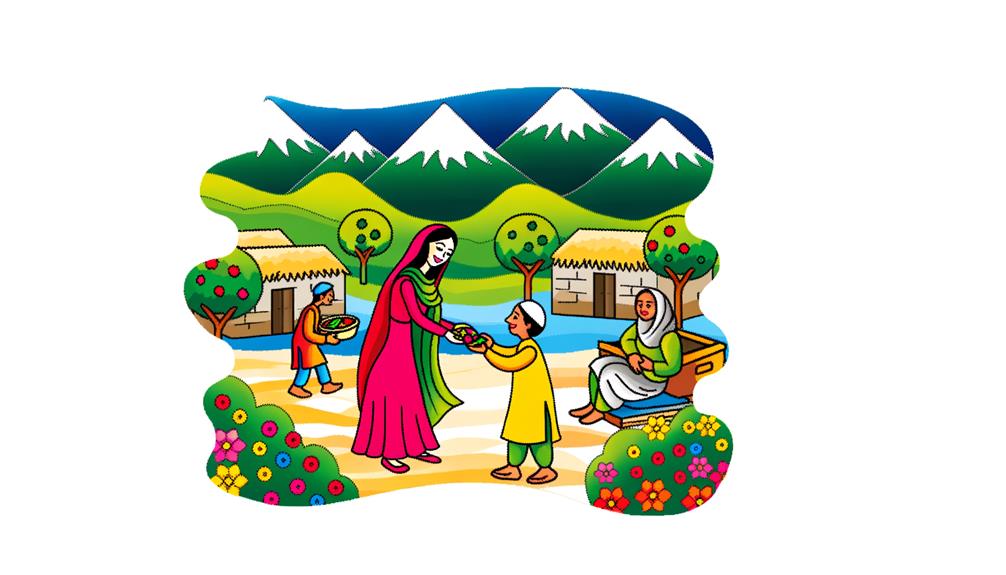Biblical Meaning of the Name Dorcas
The name Dorcas, meaning "gazelle" in Greek, embodies grace and beauty. Biblically, Dorcas, also known as Tabitha, is celebrated for her charitable works in Acts 9:36-42.
Living in Joppa, she aided the impoverished by crafting garments, thereby personifying early Christian values of compassion and service. Her resurrection by the Apostle Peter not only affirmed her importance but also led to many conversions, showcasing the transformative power of faith and altruism.
The dual names, Tabitha (Aramaic) and Dorcas (Greek), underscore a universal message of charity transcending cultural boundaries. Discover more about her exemplary life and enduring influence.

Key Takeaways
- Dorcas, derived from the Greek 'dorkas,' means 'gazelle,' symbolizing grace and beauty.
- The name Dorcas highlights her charitable nature and virtuous reputation.
- Dorcas's dual name, Tabitha in Aramaic, emphasizes her significance across different cultures.
- Her resurrection by Peter underscores the importance of charitable acts within Christian life.
- Dorcas's legacy exemplifies the integration of faith and good works in Christian belief.
Historical Context
In the New Scripture, the name Dorcas is associated with a female follower from Joppa who is also known by her Aramaic name, Tabitha. Acts 9:36-42 introduces her as a disciple renowned for her good works and acts of charity.
Historically, Joppa (modern-day Jaffa) was a significant port city, and Dorcas's deeds would have been particularly impactful in this bustling hub. Her resurrection by Peter, following her untimely death, underscores her importance to the early Christian community.
This miracle served not only as a confirmation of divine power but also as a reinforcement of charitable acts within Christian life. Dorcas's story highlights the crucial role of women in the nascent church and emphasizes the theological virtue of charity.
Etymology of Dorcas
The name Dorcas, derived from the Greek word 'dorkas,' translates to 'gazelle' and symbolizes grace and beauty, qualities that are reflected in her charitable actions as depicted in Acts 9:36-42.
This etymology is significant in understanding the cultural and theological context of her name. In the ancient world, gazelles were admired for their elegance and swiftness, traits that metaphorically align with Dorcas's compassionate and swift response to the needs of her community.
The Greek name 'Dorcas' is also synonymous with the Aramaic name 'Tabitha,' as noted in the same scriptural passage. This duality in naming emphasizes her virtuous reputation across different linguistic and cultural landscapes, enriching the understanding of her character in the biblical narrative.
Dorcas in the Book of Acts
Acts 9:36-42 meticulously recounts the life and deeds of Dorcas, also known as Tabitha, highlighting her profound impact on the early Christian community through her acts of charity and kindness. Situated in Joppa, Dorcas was renowned for her selfless dedication to aiding the needy, particularly through making garments for widows.
Her unexpected death left the community in deep mourning, prompting them to summon Peter. In an extraordinary act, Peter prayed and commanded her to arise, resulting in her miraculous resurrection. This event not only restored a beloved community member but also greatly bolstered the faith of many, leading to numerous conversions.
The narrative underscores the early Church's emphasis on compassion and the transformative power of faith.
Tabitha and Dorcas Connection
Peter's miraculous resurrection of Dorcas, referred to as Tabitha in Aramaic, highlights the interconnectedness of her dual names and their significance within the early Christian narrative. This duality is not merely linguistic but also cultural, bridging Jewish and Hellenistic communities. In Acts 9:36-42, the dual names underscore the universality of her impact and the spread of the Gospel. Theologically, Tabitha (meaning 'gazelle') symbolizes grace and beauty, while Dorcas conveys the same in Greek, illustrating the seamless integration of faith across cultures.
| Language | Name |
|---|---|
| Aramaic | Tabitha |
| Greek | Dorcas |
| Meaning | Gazelle |
This table reflects the duality, symbolizing the Church's inclusive mission. The narrative, rich in historical and theological undertones, underscores her exemplary faith.
Acts of Kindness
In the early Christian community, Dorcas's acts of kindness, as described in Acts 9:36, were a reflection of her deep faith and commitment to charitable works. Living in Joppa, she was renowned for her good deeds and almsgiving. Dorcas, also known as Tabitha, devoted herself to sewing garments and providing for the needy, embodying the Christian virtue of compassion.
Her life illustrated the practical application of faith through service, resonating with James 2:17, which teaches that faith without works is dead. The Apostle Peter's miraculous raising of Dorcas from the dead (Acts 9:40-41) highlighted God's endorsement of her charitable spirit, galvanizing the faith of many and emphasizing the importance of acts of kindness within the early Church.
Symbolism of Charity
The story of Dorcas serves as a profound symbol of charity, illustrating how selfless acts of kindness can embody and manifest the core tenets of Christian faith. Dorcas, also known as Tabitha, is mentioned in Acts 9:36-42, where her good works and acts of charity, particularly making garments for the needy, are highlighted. This kind of charity not only meets physical needs but also reflects the love and compassion central to Christian teachings.
| Aspect | Historical Context | Scriptural Reference |
|---|---|---|
| Name | Dorcas/Tabitha | Acts 9:36 |
| Acts of Charity | Making garments | Acts 9:39 |
| Resurrection | Raised by Peter | Acts 9:40 |
| Community Impact | Mourning by widows | Acts 9:39 |
| Symbolism | Embodiment of Christian charity | Acts 9:36-42 |
Her life and resurrection underscore the importance of charitable deeds in Christian communities.
Dorcas' Legacy
Dorcas, also known as Tabitha, left an indelible mark on her community through her acts of kindness, which are prominently documented in Acts 9:36-42. Her dedication to charitable deeds, especially in aiding widows by providing garments, underscores the theological imperative of service to others.
Dorcas' legacy continues to serve as a powerful scriptural example of how individual actions can profoundly impact a community.
Acts of Kindness
Renowned for her charitable deeds, Dorcas, also known as Tabitha, is celebrated in Acts 9:36-42 for her unwavering commitment to aiding the poor and vulnerable in her community. Her acts of kindness are vividly illustrated through her creation of garments for widows, reflecting a profound sense of compassion and service. This legacy of benevolence is a tangible expression of Christian love, rooted in scriptural mandates to care for the needy (James 1:27).
| Aspect | Description |
|---|---|
| Name | Dorcas (Tabitha) |
| Scripture | Acts 9:36-42 |
| Key Virtue | Compassion |
| Act of Kindness | Making garments for widows |
Dorcas' ministry exemplifies a life lived in faithful obedience to Christ's teachings on charity.
Community Impact
Dorcas' heritage of service profoundly impacted her community, as evidenced by the heartfelt mourning of the widows who showcased the garments she had lovingly crafted for them (Acts 9:39).
Her acts of charity extended beyond mere material assistance; they were emblematic of the early Christian ethic of selfless love and communal support. Dorcas embodied the virtues extolled in Proverbs 31:20, which praises a woman who 'opens her arms to the poor and extends her hands to the needy.'
Her resurrection by Peter (Acts 9:40-41) further underscores her significance, transforming her into a symbol of faith and divine intervention. Therefore, Dorcas' life and deeds offer a compelling demonstration of the transformative power of Christian charity within a community.
Lessons for Today
The life of Dorcas, as depicted in the Acts of the Apostles, offers profound lessons on compassion, service, and faith that remain relevant for contemporary believers. In Acts 9:36-42, Dorcas is described as a disciple 'full of good works and acts of charity.' Her legacy underscores several timeless principles:
- Compassionate Service: Dorcas's acts of kindness, such as making garments for the needy, remind us to serve others selflessly (Acts 9:39).
- Community Impact: Her life and miraculous resurrection by Peter highlight the transformative power of individual contributions within a community (Acts 9:40-41).
- Faith in Action: Dorcas embodies the integration of faith and works, as emphasized in James 2:26, showing that genuine faith manifests through deeds.
These lessons encourage believers to emulate Dorcas's exemplary faith and charity.
Conclusion
The name Dorcas, rich in historical and theological significance, emerges from the annals of early Christian acts of charity. As detailed in the Book of Acts, Dorcas, also known as Tabitha, exemplifies the ethos of selfless service and benevolence.
Her legacy, woven with threads of compassion and kindness, continues to inspire. What remains to be discovered is how her enduring story of charity and devotion might shape contemporary understandings of faith and community service.






